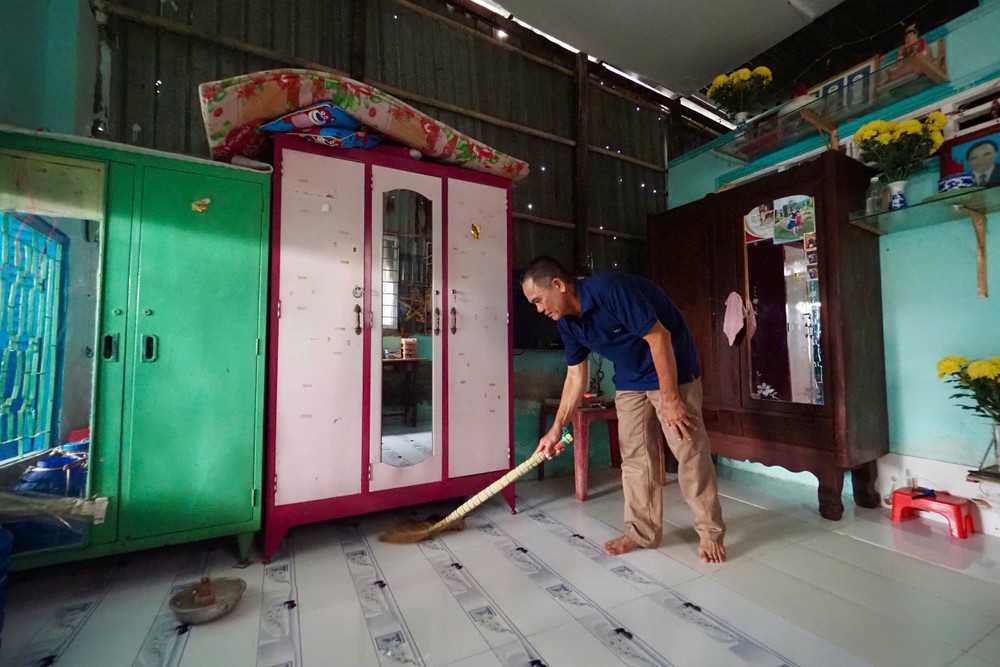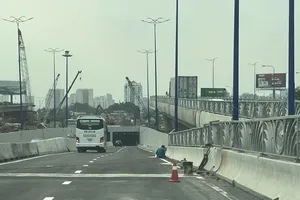
Resident Nguyen Van Dung of Giong Ao hamlet of Can Thanh town in Ho Chi Minh City’s Can Gio outlying district lives below the poverty line and supports his family by making fishing nets. His wife's frequent illnesses further strain their already precarious financial situation. Mr. Dung's house is in a state of disrepair, with large cracks penetrating the brick walls. In the past, during heavy rains and high tides, his home were often be inundated with nearly 10 centimeters of water.
To mitigate the flooding, Mr. Dung borrowed money to raise the foundation of his house. However, this solution proved to be temporary, as the house subsequently developed numerous large cracks. Despite the urgent need for repairs, Mr. Dung is unable to do so due to outstanding debts incurred from the foundation raising project.
Fortunately, Mr. Dung received financial assistance from the Government under the "Join Hands to Eliminate Temporary and Dilapidated Houses in Ho Chi Minh City in 2025" program. His house was successfully repaired with a government subsidy of VND70 million (US$2,746) on December 31, 2024. Deeply moved by this support, Mr. Dung was saying that this substantial sum of money is a lifeline for his family. His family members can finally look forward to a future where they no longer have to resort to using basins to collect rainwater during storms.
Suffering the same plight, Ngo Van Anh, a resident of An Hoa hamlet, Tam Thon Hiep Commune of Can Gio outlying district, has spent many years living in a dilapidated and aging house. This modest dwelling represents the culmination of 20 years of shared life with his wife.
Mr. Anh confided that the couple lacks stable employment, relying on sporadic income from various manual labor jobs such as construction, net making, and sewing. Their daily income fluctuates between VND200,000 and VND300,000, requiring meticulous budgeting to provide for their two growing children.
Mr. Ngo Van Anh revealed that after learning about the government's support for house repairs, his family members were overjoyed. With this financial assistance, they plan to supplement it with their own savings to build a new home, providing his children with a more spacious and comfortable environment for eating, sleeping, and studying.
The spacious residence of Mrs. Nguyen Thi Thu Ha, aged 73, located in an alley on Thich Quang Duc Street in Ward 5 of Phu Nhuan District, has recently benefited from assistance provided by local authorities for repairs.
Overwhelmed with joy, Mrs. Ha recounted that two months prior, her home was plagued by the disintegration of ceiling panels, necessitating the use of a basin to collect rainwater. With the ward's financial support of VND40 million, along with her personal savings, her home has undergone significant improvements, featuring new tile flooring, ceiling panels, and a robust roof.
Chairman Dang Xuan Binh of the Vietnam Fatherland Front Committee of Can Gio District said that the district still has about 250 temporary, dilapidated houses that need to be repaired.
The criteria for approving support for the district are implemented according to the instructions of the Vietnam Fatherland Front Committee of Ho Chi Minh City. Following the allocation of funds for households to undertake repairs on their residences, the district will oversee the utilization of these funds to ensure they are applied appropriately.
The district has built and repaired 5 houses, with a budget of VND250 million, aimed at achieving the goal of joining hands in elimination of temporary, dilapidated houses in Phu Nhuan District according to Chairwoman Tran Thi Mai Ly of the Vietnam Fatherland Front Committee of the district.
In the process of verification, there are also cases where the house is truly uninhabitable but there are no documents, or the house inherited jointly is disputed. In this case, the local government directly mobilizes the co-heirs to persuade them to agree to repairs. The district also assists households in applying for building permits and preparing drawings for free.
The VND50 million per home is not enough to repair the larger homes, so the local administration is mobilizing philanthropists to provide additional funding.
A representative of the Fatherland Front Committee of District 4 said that according to current regulations, procedures for repairing and building new houses must have a construction permit or a permit to repair and renovate works.
The report from the Ho Chi Minh City People's Committee indicates that, in alignment with the Prime Minister's initiative "The whole country joins hands to eliminate temporary and dilapidated houses by 2025," a review has revealed that there are 325 households classified as poor or near-poor in Ho Chi Minh City. They are experiencing housing challenges and require assistance for construction and repairs.
As per the regulations set by the Ho Chi Minh City Fund for the Poor Mobilization, Management, and Use Board, the cost for constructing a house of gratitude is VND80 million per house, while it is VND90 million per house in Can Gio and Nha Be suburban district. Similarly, the cost of building a charity house is VND60 million per house, increasing to VND70 million per house in Can Gio and Nha Be districts.
The program will be implemented over 2024 and 2025, divided into two phases. In Phase 1 from December 23, 2024 to January 22, 2025, some 100 new charity houses will be renovated or constructed. While 223 additional new houses will be renovated or constructed in Phase 2.
Ho Chi Minh City aims to eliminate all temporary and dilapidated housing for poor, near-poor, and disadvantaged households by April 30, 2025.
























